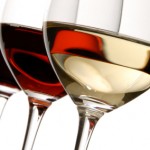My wife clipped an article from The Wall Street Journal last week and stuck in my "read this, Peter" stack she keeps. I got around to it yesterday and was impressed enough to do the background research. The writer had looked at the 2010 Dietary Guidelines for Americans and focused on the beneficial effects of moderate alcohol consumption.
Well that caught my attention; I drink a glass of wine two or three nights a week, rarely drink two and never more than that
The author of the short article, Stanton Peele, is a psychologist, attorney and writer on addiction recovery. He is a PhD, JD who has written nine books on addiction and has a different view than the "Disease Model" that many of us were taught in our medical training. His take is the "Life Process Model"in which addicts use their drug of choice to cope wih life. I did note that eleven years back some of his research was sponsored by the Distilled Spirits Council and the Wine Institute (their support of his work ended in 2000).
Okay that made me a sceptic, but I decided to read the section on alcohol in the recently released 2010 DGAC. It begins by emphasizing the hazards of heavy EtOH intake, quoting a 2009 study attributing 90,000 deaths a years to alcohol "misuse" in the United States. It also estimates that 26,000 deaths were averted (I like that term better than prevented since eventually we all die) by moderate EtOH consumption.
The traditional definition of moderate is one or two drinks per day for males and one per day for females. A lot of people exceed those levels with 2009 and 2010 studies showing estimates of 9% of men and 4% of women drinking heavily.
So what's the good stuff assuming you're an adult, not pregnant, don't have a drinking problem and don't have disease that are exacerbated by alcohol? it appears from extensive reviews of the medical literature that moderate drinking isn't associated with weight gain (remembering that EtOH is "empty calories and you still have to eat a balanced diet). Also moderate evidence supports less cognitive decline with age in moderate drinkers and strong evidence "consistently demonstrates" a lower risk of coronary heart disease in moderate drinkers. Bone health as shown by the incidence of hip fractures appears to be improved by moderate drinking.
MVAs and drowning as well as falls are more likley with heavy drinking, but the risk for these is less well estbalished with moderate drinking.
There's even a section on lactation and breastfeeding; Alcohol reduces milk production and decreases infant milk consumption for three to four hours after alcohol is consumed, but the DGAC concluded that after age two to three months, an infant's exposure would be negligable if the mother waited three to hour hours after consuming a single drink before breastfeeding.
And of course nobody is urging you to start drinking if you don't already.
So I'm going out to dinner with my wife and a friend tonight and will order a glass of wine.
But she's going to drive home.






